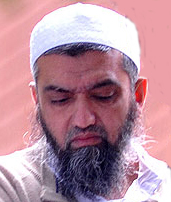New Delhi, May 5: Early in 2010, detectives walked into a grocer's store in Bolton, 16 km from Manchester, looking for a man his closest friends called “Tiger.” For 17 years, police in Gujarat had been hunting for Muhammad Hanif Patel, wanted for his alleged role in a 1993 grenade attack on a train which left an eight-year-old girl dead and 12 people injured.
This week, the greying 54-year-old businessman lost a desperate legal battle to avoid extradition to India. His trial, when it begins later this summer, will exhume some of India's most painful post-independence history.
In December 1992 when Hindutva groups demolished the Babri Masjid sparking off murderous communal violence nationwide, Mr. Patel was a successful construction magnate. His United Kingdom-based father, Umarji Patel, belonged to an influential Muslim family, part of Surat's well-heeled business élite. Mr. Patel busied himself organising relief camps for the thousands of Muslims displaced in the violence, often carried out by police-backed mobs.
He also, police claim, participated in a plan to kill.
Babri Masjid to Black Friday
From evidence produced during the trials of several men already convicted for the bombing, at least some of Surat's besieged Muslims felt the need for more muscular kinds of assistance. The former State Minister and Fisheries Board Chairman Mohammad Surti — who received a 20-year sentence for his role in the bombing last year — called top ganglord Abdul Latif for help. In April 1993, Mr. Latif is alleged to have met with Mr. Surti, his son Farooq Surti, local Congress politician Iqbal Wadiwala, Husain Ghadiyali, Salim Chawal and Mr. Patel himself.
Later that month, Mr. Ghadiyali drove a Maruti van, with a dozen hand-grenades, two Kalashnikov rifles, and a hundred rounds of ammunition to Surat. The grenade thrown at the Gujarat Express on April 22, 1993 was intended to have demonstrated that killing Muslims would not be cost-free.
Nothing in the Gujarat Police's files, or the trial records, suggests Mr. Patel had a direct role in the bombing. Mr. Ghadiyali, whose wife tied a rakhi on the ganglord's wrist each year in a ritual gesture of brotherhood, was the central actor.
Mr. Latif — later to die in a controversial encounter — was no jihadist. Long, a key figure in Gujarat's lucrative bootleg racket, he had clawed his way into the State's élite by ruthlessly eliminating his rivals. He won support by acting as a source of patronage and protection — and bought impunity by building a close relationship with the local Congress. In 1987, then in jail facing trial on murder charges, he fought and won elections from five Ahmedabad municipal wards.
In the wake of the 1992-1993 carnage, ganglords like Mr. Latif came under pressure from communities torn apart by communal violence — and turned to Pakistan's Inter-Services Intelligence Directorate for help. In February 1993, Karachi-based ganglord Dawood Ibrahim Kaskar ordered networks to stage reprisal attacks. From a confessional statement made by Dawood Ibrahim's lieutenant Usman Gani Merchant, we have some idea of what was discussed at the meeting, where the decision for ‘revenge' was taken.
Mr. Kaskar's operatives set off 13 improvised explosive devices in Mumbai on March 12, 1993, killing more than 250 people — the largest terrorist attack in India's history, known popularly as the Black Friday bombings. The explosives, grenades and assault rifles used in the course of the revenge operation were provided by the ISI, which hoped to set off a communal war in India.
The weapons used in Surat, investigators later discovered, were part of a larger consignment of 57 Kalashnikov assault rifles, several dozen grenades given to Mr. Latif by Mr. Kaskar, with instructions to carry out similar operations in Gujarat.
Led by a Latif gang member called Rasool Khan ‘Party,' his nickname derived from slang for businessman, the crime syndicate carried out strikes in a Surat marketplace, and at eight locations in Ahmedabad — killing 10.
Mr. Latif fled India for a time, dumping his remaining cache of 30 assault rifles and grenades in Jharnea, in Madhya Pradesh. Police allege the weapons were transported there by Sohrabuddin Sheikh, who was killed in a 2005 shootout with the Gujarat Police, now known to have been staged to settle a business-related feud. In 1995, Mr. Latif returned to India after a falling-out with Dawood Ibrahim, and was killed in a controversial encounter.
Following the murderous 2002 communal riots in Gujarat, elements of the group built alliances with jihadist groups, laying the foundations for a new phase of retaliatory violence. Rasool Khan ‘Party' hid out in Hyderabad, where he made contact with controversial Islamist cleric Maulana Mohammad Naseeruddin. Following the murderous 2002 communal riots in Gujarat, Rasool Khan is alleged to have funded the travel of jihad recruits to training camps in Pakistan. Mr. Khan, like other key figures in these networks, is thought to be in Pakistan.
Mr. Patel, though, appeared to want no part in the war he had been dragged into in the summer of 1993. He jumped bail, fled to the U.K., where his father has construction interests. Mr. Surti's son Farooq Surti, Salim Lala and Farooq Gajnabi, are also believed to be overseas.

Tiger Hanif





Comments
Add new comment